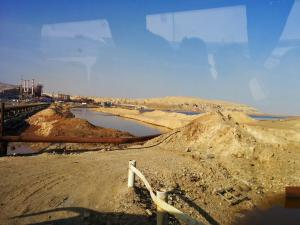 Now here is a text really to sink your teeth into! It raises all manner of fraught questions about God, about human beings, and about the relationships between them. In short, it is a kind of microcosm of the most basic issues that the Hebrew Bible addresses. Those of you out there who continue to foment that foolishness that the Hebrew Bible is all about “God’s wrath” needs to have this grand text tattooed on your forehead, backwards, so that you can daily read it in the closest mirror. There are far too many questions raised here for one brief essay, but I will try to focus this time on issues that may inform a modern sermon or teaching event.
Now here is a text really to sink your teeth into! It raises all manner of fraught questions about God, about human beings, and about the relationships between them. In short, it is a kind of microcosm of the most basic issues that the Hebrew Bible addresses. Those of you out there who continue to foment that foolishness that the Hebrew Bible is all about “God’s wrath” needs to have this grand text tattooed on your forehead, backwards, so that you can daily read it in the closest mirror. There are far too many questions raised here for one brief essay, but I will try to focus this time on issues that may inform a modern sermon or teaching event.
We find ourselves in the midst of the quite lengthy tale, at least in biblical terms, of Abram (Abraham) and Sarai (Sarah) and their attempts to fulfill the sudden and surprising call of YHWH to go to a strange land and there found a great nation. This call is made all the more difficult by the unfortunate fact of Sarah’s barrenness (Gen.11:30). After Abe tries to give Sarai away to the besotted pharaoh (Gen.12), after Abe gives his nephew Lot first dibs on the best parcel of YHWH’s promised land and he, unfortunately for him, chooses the “well-watered plain of the Jordan,” including the supposed garden spots of Sodom and Gomorrah (Gen.13), after Lot is rescued by a now warlike Abe from five kings (Gen.14), after YHWH (actually Elohim in this story) makes a bloody covenant with Abe and promises him, again, vast progeny, after Abe mates with a slave who produces a son, Ishmael, whom Sarai detests and demands that Abe throw the slave and her son out of the camp (Gen.16), after the covenant of circumcision is made between Abe and El Shaddai (Gen.17), and after YHWH decides to find out if the horrors of Sodom are really as bad as God has been told, Abe and YHWH confront one another above the proverbially evil city. (Side note: the sin of Sodom is NOT, repeat not, the supposed sin of same-sex relationships; ALL the people of Sodom, every man, woman, and child (Gen.19:4) demand to be given the visiting angels in order to abuse them sexually—this is gang rape, and the very opposite of Middle-Eastern hospitality. All other Hebrew Bible references to the Sodom story say absolutely nothing of sexual activity of any kind, but decry the abuse of wealth and appropriate hospitality.)
At Gen.18:22, the first arresting textual anomaly occurs. The Hebrew text reads: “The men (angels) turned from the place, while YHWH stayed standing before Abraham.” Early commentators, who were charged with copying the text, found this sentence offensive; YHWH should not be portrayed as standing before Abe; Abe should be seen as standing before YHWH! So, the early copyists changed the text to match their theological proclivities, but, because they knew that actually changing the sacred word was in general a big no-no, they footnoted their change, in effect admitting the near sacrilege they had performed. In 17 other places in the Hebrew text, a similar kind of change was made, but each time the change was announced and admitted. These are the so-called “18 scribal emendations,” and here is the first.
However one is to view the opening of the scene, Abe and YHWH are toe-to-toe, eye-to-eye above Sodom, and Abe speaks first. What he says is decidedly unexpected. “Will you really sweep away the righteous with the wicked? Suppose there are fifty righteous in the city; will you sweep away the place and not forgive it for the fifty righteous who are in it? Far be that from you to do such a thing, to kill righteous with wicked! Far be that from you! Shall not the judge of all the earth do what is right” (Gen.18:24-25)? Indeed, I guess. Is it the case that a few righteous folk can leaven the whole loaf so as to make all those wicked safe from YHWH’s anger? As the tale proceeds, Abe argues YHWH down to the number ten; if ten righteous are found, Abe demands that YHWH spare all of Sodom. From this story comes two long-standing Jewish traditions: the need for ten men to form a Jewish community (minyan) and the belief in some Jewish circles that as long as ten righteous people can be identified, the whole world is safe from God’s wrath. (The remarkable novel by Andre Schwartz-Baert, The Last of the Just, is based on that second notion; the Holocaust of Judaism in World War II occurs, because ten righteous ones are no longer found.) Still, Sodom is destroyed, because YHWH’s search for any righteous in the city is fruitless.
Two important issues arise from my reading of this story today. First, Abe’s demand that YHWH must be just raises the primary idea of the nature of God in the universe. If God is just, how is God just, and how can we tell of God’s justice? And if God is not just, as we define justice, then is the world merely and sadly only random, God not being involved in it at all? This is, of course, the long-argued question of theodicy, where the supposed goodness of God meets the supposed power of God: if God is good while there is evil in the world, either God chooses not to confront/destroy evil, and is therefore not all good, or God cannot confront/destroy evil and is therefore not all- powerful. This is perhaps the most famous conundrum in all of theology. The story in Genesis makes the assumption that God can in fact destroy evil, being all-powerful, but will allay the divine hand if some good persons can be found in the midst of all the evil. This, I suppose, is a kind of grace; God refuses to unleash divine power against the wicked if that wickedness is overcome by demonstrable human good. Those who strive for the good have an enormous responsibility in the divine plan, given the premises of this story.
The second question has to do with the fact that Abe remonstrates with YHWH at all! In nearly every other story of Abe in the texts of Genesis, he is either passive in the face of God’s or Sarah’s demands of him, even to the point where he is asked to murder the son that he waited 100 years to obtain! Without a whimper, he heads for the mountain, knife and wood carried by the boy, to slaughter him, and though he is stopped by the visiting angel, no amount of textual legerdemain can avoid the fact that he planned to stab his son to death. But here above the city of Sodom, Abe becomes downright loquacious, demanding that YHWH do precisely what he asks. Would that he had cared for his son as much! Just what sort of person is this chosen one of God? That question needs a serious response, and this grand text offers to us another way to see the patriarch.
A preacher could spend more than a few sermons pondering the questions raised by this text; I have barely scratched the surface. I leave its wonders to you!
(Images from Wikimedia Commons)











